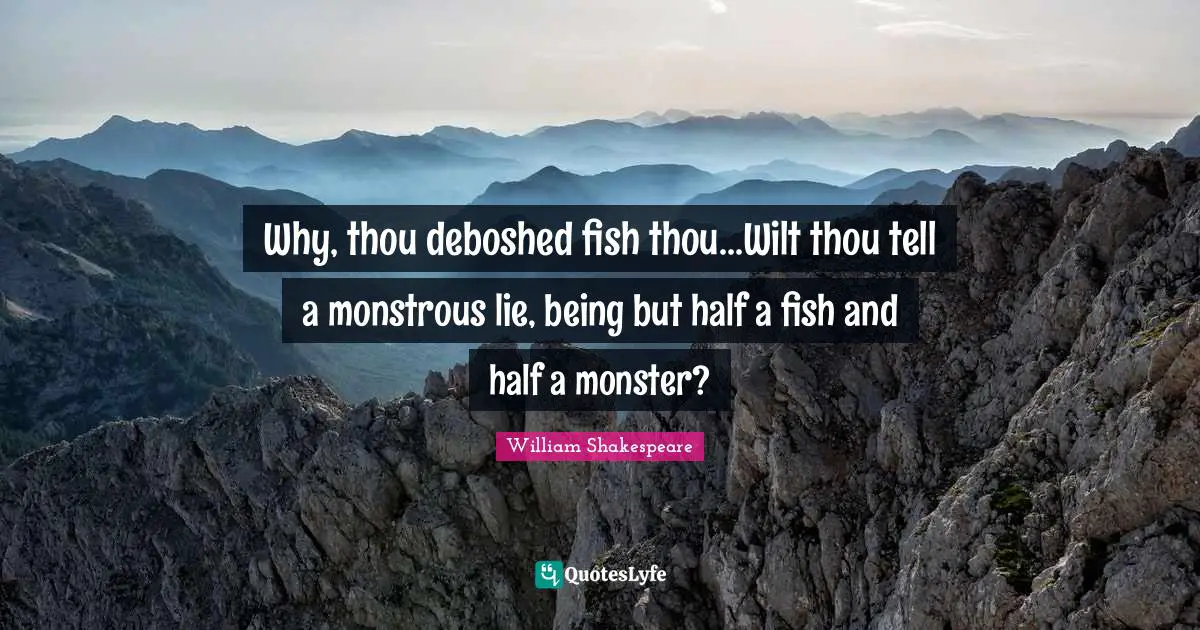Thou Deboshed Fish New World: A Deep Dive Into The Mysteries Of The Ocean
Ever heard the term "thou deboshed fish new world"? It might sound like a random phrase, but it carries a fascinating story. Imagine diving into the depths of the ocean, discovering new species, and unraveling mysteries that have intrigued scientists and explorers for centuries. This is not just about fish; it's about the entire ecosystem and the wonders of the underwater world. So, buckle up, because we're about to take a thrilling journey!
Picture this: you're standing on the edge of a boat, staring into the vast expanse of blue water. The ocean holds secrets that we're only beginning to understand. The phrase "thou deboshed fish new world" might seem odd, but it's a nod to the incredible discoveries we've made in marine biology. This isn't just about fish; it's about the entire ecosystem beneath the waves.
As we explore the depths of the ocean, we'll uncover the mysteries of marine life, from the smallest plankton to the largest whales. This journey will take us through the history of exploration, the latest scientific discoveries, and the challenges facing marine ecosystems today. Let's dive in!
Read also:Secure Remote Access With Remoteiot Ssh A Comprehensive Guide
The Origins of "Thou Deboshed Fish New World"
Let's start by breaking down the phrase "thou deboshed fish new world." At first glance, it might seem like a random collection of words, but it has a rich history. The term "deboshed" is an archaic word meaning "wild" or "untamed," and it perfectly describes the ocean's unpredictable nature. The "new world" part refers to the uncharted territories of the ocean, which are still being explored today.
Historically, the ocean has always been a source of mystery and wonder. From ancient mariners to modern scientists, people have been fascinated by what lies beneath the waves. The phrase "thou deboshed fish new world" captures this sense of adventure and discovery.
Unveiling the Mysteries of Marine Life
Marine life is incredibly diverse, and new species are being discovered all the time. Scientists estimate that there could be millions of species in the ocean that we haven't even identified yet. This diversity is what makes the ocean so fascinating.
- Over 230,000 known species live in the ocean.
- Scientists believe there could be up to 2 million species yet to be discovered.
- The ocean covers 70% of the Earth's surface and contains 97% of the planet's water.
From bioluminescent creatures in the deep sea to colorful coral reefs, the ocean is a treasure trove of biodiversity. Each discovery brings us closer to understanding the complex web of life that exists beneath the waves.
Exploration and Discovery: The Early Days
The history of ocean exploration is filled with tales of daring adventurers and groundbreaking discoveries. In the early days, explorers relied on rudimentary tools and a lot of courage to navigate the seas. They mapped coastlines, discovered new islands, and encountered strange creatures that they had never seen before.
One of the most famous early explorers was Captain James Cook, who mapped much of the Pacific Ocean in the 18th century. His voyages opened up new worlds and laid the foundation for modern oceanography. Today, we have advanced technology that allows us to explore the ocean in ways that early explorers could only dream of.
Read also:Unveiling The Mysteries Of Sone 436 Plot A Comprehensive Guide
Modern Oceanography: Tools and Techniques
Modern oceanography uses a variety of tools and techniques to study the ocean. Submersibles, remotely operated vehicles (ROVs), and autonomous underwater vehicles (AUVs) allow scientists to explore the deepest parts of the ocean. Satellites provide data on ocean currents, temperature, and salinity, while underwater sensors monitor marine life and environmental conditions.
- Submersibles can dive to depths of over 10,000 meters.
- ROVs are used to collect samples and conduct experiments in extreme environments.
- AUVs can operate independently for long periods, providing valuable data on the ocean floor.
These tools have revolutionized our understanding of the ocean and its inhabitants. They allow us to study everything from the behavior of marine animals to the effects of climate change on ocean ecosystems.
The Impact of Climate Change on Marine Ecosystems
Climate change is one of the biggest challenges facing marine ecosystems today. Rising temperatures, ocean acidification, and sea level rise are all having a profound impact on marine life. Coral reefs, which are some of the most biodiverse ecosystems on the planet, are particularly vulnerable.
Scientists are working hard to understand the effects of climate change on the ocean and develop strategies to mitigate its impact. This includes protecting marine habitats, reducing pollution, and promoting sustainable fishing practices.
Conservation Efforts: Protecting Marine Life
Conservation efforts are crucial for protecting marine life and ensuring the health of ocean ecosystems. Marine protected areas (MPAs) are one of the most effective tools for conserving biodiversity. These areas restrict human activities such as fishing and mining, allowing ecosystems to recover and thrive.
- There are over 8,000 MPAs worldwide, covering about 7% of the ocean.
- MPAs have been shown to increase fish populations and improve ecosystem health.
- International agreements, such as the Paris Agreement, aim to reduce greenhouse gas emissions and protect marine environments.
By working together, we can help protect the ocean and its incredible biodiversity for future generations.
Thou Deboshed Fish: The Role of Marine Life in Human Culture
Marine life has played an important role in human culture for thousands of years. From ancient myths and legends to modern art and literature, the ocean has inspired countless works of creativity. The phrase "thou deboshed fish new world" reflects this cultural connection, highlighting the wild and untamed nature of the ocean.
Fish and other marine creatures have been a source of food, medicine, and economic opportunity for many communities around the world. They have also been the subject of scientific study, leading to important discoveries about the natural world.
Marine Life in Mythology and Folklore
Many cultures have myths and legends about marine life. In Greek mythology, Poseidon was the god of the sea, and his trident was a symbol of his power. In Norse mythology, the sea serpent Jormungandr was said to encircle the world. These stories reflect the awe and respect that people have always had for the ocean and its mysteries.
Today, marine life continues to inspire artists and writers. From Jules Verne's "Twenty Thousand Leagues Under the Sea" to James Cameron's "Avatar," the ocean has been a source of endless fascination and creativity.
Scientific Discoveries: The Latest Findings
Scientists are making groundbreaking discoveries about marine life all the time. From new species to unusual behaviors, the ocean continues to surprise and amaze us. Recent studies have revealed fascinating insights into the lives of marine animals and the ecosystems they inhabit.
For example, researchers have discovered that some species of fish can recognize themselves in mirrors, indicating a level of self-awareness that was previously thought to be limited to humans and a few other animals. Other studies have shown that coral reefs can recover from bleaching events if given enough time and protection.
Technological Advancements: Enhancing Our Understanding
Advances in technology are enhancing our understanding of marine life in ways that were once unimaginable. DNA sequencing allows scientists to identify species and study their genetic makeup, while advanced imaging techniques provide detailed views of underwater environments.
- Genetic analysis has revealed that some species of fish can survive in extreme environments, such as hydrothermal vents.
- Imaging technology has shown that coral reefs are more complex than previously thought, with intricate structures that support a wide variety of life.
- AI and machine learning are being used to analyze large datasets and identify patterns in marine ecosystems.
These advancements are helping us unlock the secrets of the ocean and understand the complex interactions that occur within marine ecosystems.
Challenges Facing Marine Ecosystems
Despite the incredible progress we've made in understanding the ocean, there are still many challenges facing marine ecosystems. Overfishing, pollution, and habitat destruction are all taking a toll on marine life. It's up to us to address these issues and work towards a more sustainable future.
One of the biggest challenges is plastic pollution. Millions of tons of plastic waste enter the ocean each year, harming marine animals and disrupting ecosystems. Scientists are working on solutions to reduce plastic waste and develop alternatives to single-use plastics.
Community Action: Making a Difference
Community action is key to protecting marine ecosystems. Individuals, organizations, and governments all have a role to play in promoting sustainability and reducing the impact of human activities on the ocean.
- Beach cleanups and marine debris removal projects help reduce pollution and protect marine habitats.
- Supporting sustainable fishing practices can help ensure that fish populations remain healthy and abundant.
- Advocating for stronger environmental policies can lead to better protection for marine ecosystems.
By working together, we can make a difference and help preserve the ocean's incredible biodiversity.
Conclusion: The Future of Thou Deboshed Fish New World
In conclusion, the phrase "thou deboshed fish new world" captures the essence of the ocean's wild and untamed nature. From the earliest explorers to modern scientists, people have been fascinated by the mysteries of the underwater world. The ocean is home to an incredible diversity of life, and it plays a vital role in the health of our planet.
However, the ocean faces many challenges, including climate change, pollution, and overfishing. It's up to us to address these issues and work towards a more sustainable future. By protecting marine ecosystems and promoting conservation efforts, we can help ensure that the ocean remains a source of wonder and inspiration for generations to come.
So, what can you do? Start by reducing your plastic use, supporting sustainable fishing practices, and advocating for stronger environmental policies. Share this article with your friends and family, and let's work together to protect the incredible world beneath the waves. The future of the ocean depends on all of us!
Table of Contents
- The Origins of "Thou Deboshed Fish New World"
- Unveiling the Mysteries of Marine Life
- Exploration and Discovery: The Early Days
- Modern Oceanography: Tools and Techniques
- The Impact of Climate Change on Marine Ecosystems
- Conservation Efforts: Protecting Marine Life
- Thou Deboshed Fish: The Role of Marine Life in Human Culture
- Marine Life in Mythology and Folklore
- Scientific Discoveries: The Latest Findings
- Technological Advancements: Enhancing Our Understanding
- Challenges Facing Marine Ecosystems
- Community Action: Making a Difference
- Conclusion: The Future of Thou Deboshed Fish New World


